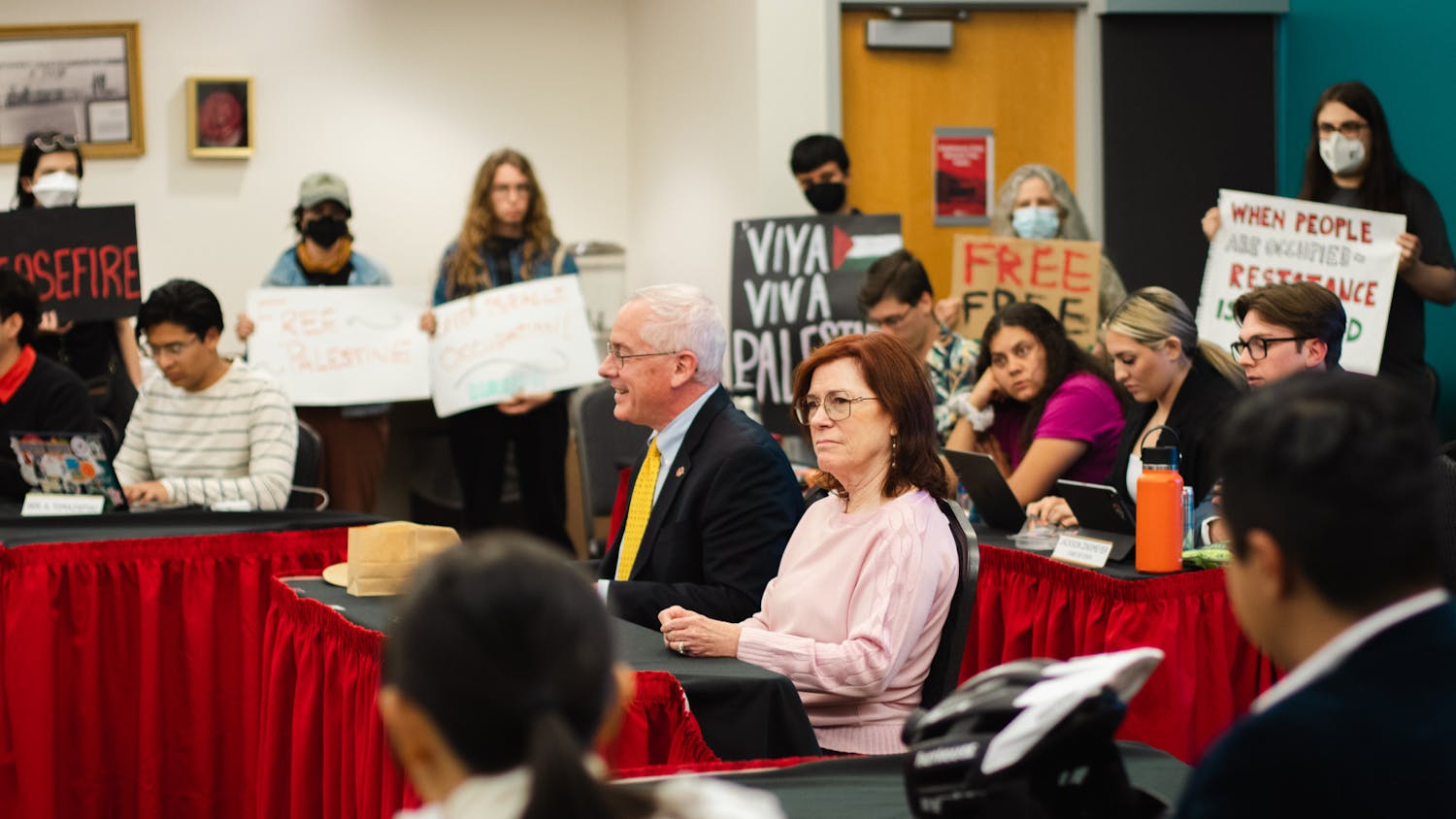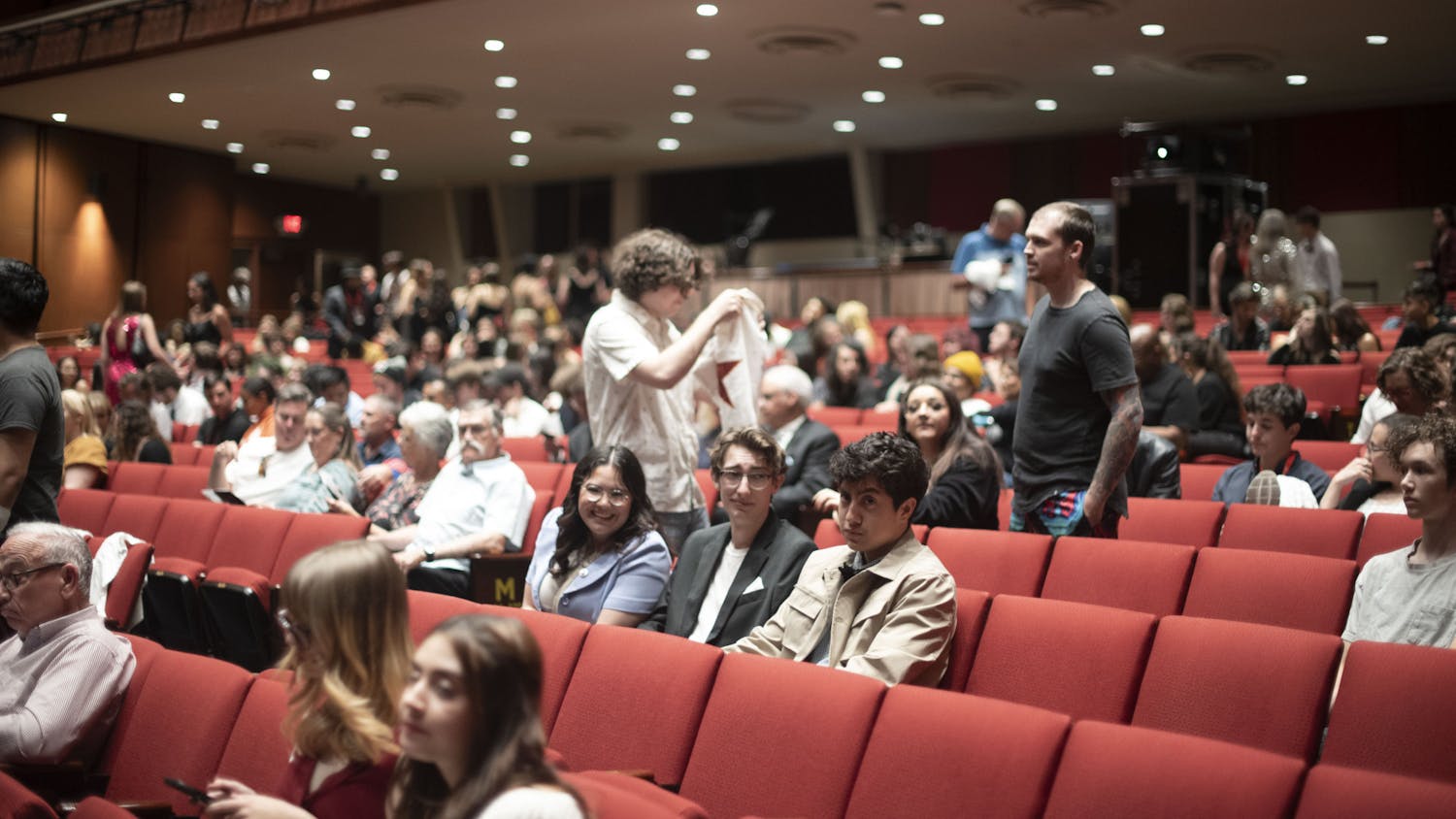Yale law professor Akhil Reed Amar visited UNM last week to discuss the Constitution and its continuing importance in American society.
The Daily Lobo was able to sit down with him to discuss his book, as well as the first month of the Trump administration.
DL: Can you give a general overview of the argument you make in your book, and specifically the argument you make about the modern presidency?
ARA: The book is not driven by a single thesis. It actually is a collection of topics and what holds the book together is that the topics are ripped from the headlines. I tried to address the biggest constitutional issues that have arisen in the last 20 years.
The book collects, reorganizes, revises and rethinks op-eds and other short pieces written for the public originally published in places like the New York Times, Atlantic Magazine, the Wall Street Journal, the Washington Post, Slate and similar venues. The opening chapters focus on the branches of government: the presidency, the vice presidency, Congress, the judiciary.
Later chapters focus on culture wars, criminal procedure issues. And then the final three chapters focus on three distinctive constitutional dramas, one for each of the three most recent presidents — Bill Clinton’s impeachment, George W. Bush’s unusual election in 2000 and the Obamacare debate.
DL: Am I correct in saying you don’t align with the platform of either major political party?
ARA: I’m a registered Democrat. I voted for Hillary Clinton, I supported Barack Obama, but on certain things my views are not the party line.
In this book I defend Citizens United, believe it or not. I say that there is a constitutional right to have a gun in the home for self-protection, and I don’t have one in mine, but I’m trying to give my honest, constitutional opinion. I criticized the Supreme Court’s criminal procedure jurisprudence from the right of the political spectrum. I am a critic, for example, of the Exclusionary Act, which many liberals like and many conservatives doubt.
So I am a Democrat, and on may issues I do align on views on the political and legal left, but not on all positions. I supported, very strongly, (Obama’s supreme court nomination from 2016) Merrick Garland, and I will expect to be supporting (Trump’s nominee) Niel Gorsuch.
DL: In your opinion, does the new presidential administration pose any new or unique threats to constitutional law?
ARA: Yes. We’ve never had a president with no government experience, no public service whatsoever, and that raises some real questions. We’ve never had a president who assumed office at this late age, and that raises issues of possible dementia or senility.
Get content from The Daily Lobo delivered to your inbox
We’ve never had a president who seems so unwilling to do homework of a certain sort. We’ve never had a president who shoots from the hip to this extent. We’ve never had a president, I think, who has begun his time in office with such a scattershot and strident attack on judges.
Even though, I must say, I have some doubts about what some of the judges have been saying against the Trump administration in the last month. I think the legal issues are far more complicated and some of them more favorable to Trump than the 9th Circuit or the federal judge in Virginia seem to believe.
DL: You’re talking specifically about the travel ban then?
ARA: Yes. The travel ban raises some issues, but no one should think that this is an easy slam-dunk against the Trump administration.
Now, I expect that he’s going to issue a new order rather than trying to litigate this one in every manner. Presidents are permitted to speak out. They have freedom of speech. Presidents are permitted to criticize judges, and some of our greatest presidents have, including Abraham Lincoln (and) Franklin Roosevelt.
But the way in which he has done it does seem to me to be unusual to unprecedented.
DL: Have there been any specific instances of unconstitutionality in the first few weeks of the administration?
ARA: I am not joining those who have proclaimed the travel ban flagrantly unconstitutional. There may be some constitutional problems with it, but they are smaller and more nuanced than I think other critics believe.
There may be all sorts of things to come that may be very constitutionally troubling, but I’m not crying wolf and I’m keeping my powder dry. If this is as bad as it gets, then I will breathe a sigh of relief because I am afraid there might be worse things to come. And if and when they do come, I don’t want to have lost credibility by crying wolf too soon.
I am heartened by his nomination of Judge Gorsuch. I think that was a good nomination from that side of the aisle. I would have loved to see Merrick Garland on the Supreme Court, but that’s not going to happen because he won the election and the Republicans won the Senate and they get to pick. If the Republicans are going to pick, I can’t think of anyone better of Neil Gorsuch.
So I expect to be supporting him as more information comes out. That was a very big decision that the president made, a constitutional decision, and in my mind he aced that one. And I voted against him, and I fiercely opposed him in many respects, but I’m trying to be sober and fair, because he is not always himself sober and fair. We who are skeptical of him should not follow suit. We have to keep our wits about us.
DL: How do you think the application of the Constitution has changed throughout America’s history? Has it changed specifically in this modern era of American politics?
ARA: Huge question. The biggest change is that the original Constitution was pro-slavery. The
Electoral College, in fact, was initially adopted to facilitate slavery. Then we had the Civil War and we got rid of slavery, and our Constitution is now emphatically anti-slavery.
So our Constitution has changed dramatically. It was democratic in many ways for its time when it was adopted, but it has become far more democratic over the course of history. Blacks vote. Women vote. Poor people vote. Young adults vote. That’s an amazing (transformation), and it’s visible in the text of the Constitution itself with amendment after amendment saying “the rights to vote”— five of them in all, phrases that didn’t appear in the original Constitution.
So on democracy there’s been tremendous progress. On slavery, a u-turn from a pro-slavery document to an emphatically anti-slavery document. Amendments have added additional and necessary rights to the system again and again and again — not just voting rights, but other rights.
Courts over the course of American history, especially in the 20th century, have redeemed some of the promises in the document that weren’t always enforced. It was a revolution in the 20th century — the Warren court revolution — that I largely embrace and applaud. And it depends on what we mean by modern era.
Before Earl Warren was Chief Justice, there’s massive disenfranchisement and malapportionment in America There’s de jure racial segregation and apartheid and white supremacy entrenched in law. There’s organized sectarian prayer in the schools. The Bill of Rights doesn’t reliably apply in state and local governments against the federal government.
Free speech and free expression have almost never won in the Supreme Court. And criminal defendants, especially indigent defendants, have precious few constitutional rights. Warren’s court changed all that dramatically. That was a constitutional revolution. And I think in general they did the right thing. I have some criticism of the exclusionary rule, but in general they did the right thing. That’s a revolution.
If, by modern era, you mean the last 20 years, I would say our constitutional system has been largely in place since the Warren court, and both Republicans and Democrats have built on the Warren court. Republicans think they oppose it and sometimes criticize it, but they’ve actually accepted it.
So in fact there is the new consensus, and it’s organized around the Warren court. Republicans have a conservative interpretation of the Warren court, and liberals have a liberal interpretation, but they both accept the Warren court revolution. And that’s progress, concretely. Conservatives accept freedom of speech but they say, “Oh, that means for corporations too.” Citizens United.
Conservative accept that the Bill of Rights applies against the state, but they say, “oh, that also means gun rights.” Conservatives accept one person, one vote, but they actually think that means Bush vs. Gore. They accept religious equality, but they want to make sure religions aren’t discriminated against.
Conservatives accept Brown v. Board of Education, but they think that actually the Constitution is colorblind and affirmative action is problematic. But they agree that law should never be discriminated against people of color, and that’s progress. There’s a liberal interpretation of the Warren Court that goes further in every respect, but the conservatives, I believe, are actually largely accepting of the basic premises of the Warren court, and that’s real progress.
DL: Do you see the Constitution as having lost any power over time?
ARA: I think ordinary citizens don’t read the Constitution as much as they should. Whether they’re reading it less now than 20 years ago I cannot say. What I can say is that it is easier than ever before to read the Constitution than ever before because the Internet makes it so easy to look things up and to find information about the Constitution without having access to a major research university library, without being a gifted researcher.
You can learn so much more about the Constitution for free now than 20 years ago. So even if Constitutional literacy has remained flat, that would be a disappointment because it should be increasing, improving because it’s so much easier to do it.
Concretely, I’m really that grateful you came. But some people in your generation didn’t show up at elections. And that’s unfortunate, and maybe because they don’t have a sense that the Constitution is important to them, that it speaks to them and their issues.
That’s unfortunate because I grew up in the ‘60s, and young people mobilized in the streets, but they also fought for the right to vote. And when they got it they voted. I think voting rates among young people have been disappointing the last two elections: the off-year election in 2014 and the general election in 2016.
Gabriella Rivera is a news reporter at the Daily Lobo. She can be reached at news@dailylobo.com or on Twitter @DailyLobo.





